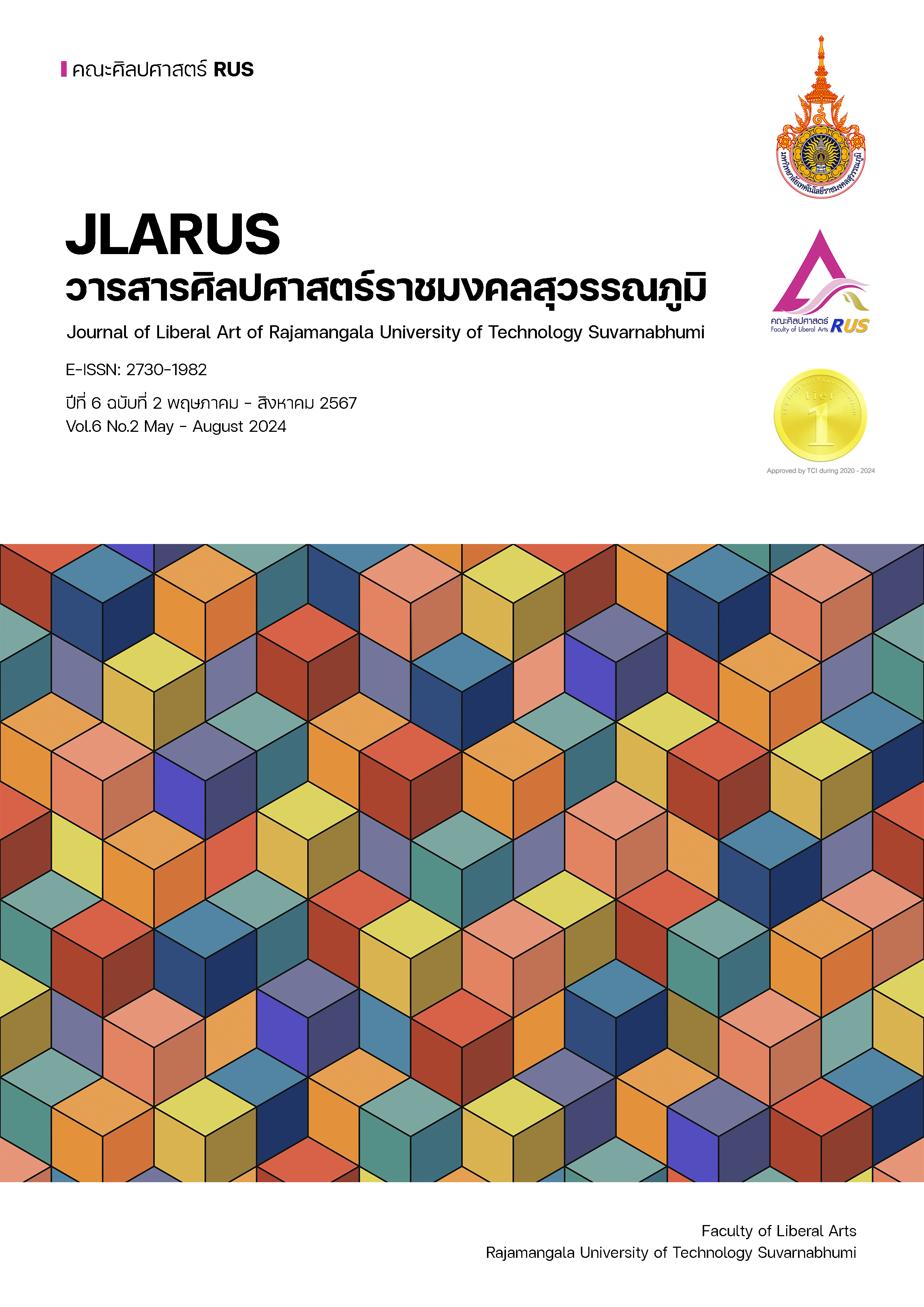FACTORS AFFECTING THAI TOURISTS’ INTENTION TO TRAVEL: THE PHUKET CITY OF GASTRONOMY STUDY
Main Article Content
Abstract
The aim of this study was to investigate four key areas: 1) sustainable tourism behavior, 2) gastronomy affection, 3) the theory of planned behavior, and 4) factors influencing Thai tourists’ intentions to travel to a city of gastronomy. The research employed a quantitative methodology and was conducted in Phuket province. Convenience sampling was used to select a sample of 420 Thai tourists who had traveled to Phuket, and data were collected through a questionnaire. The data were analyzed using descriptive statistics, including frequency, percentage, mean, and standard deviation, as well as inferential statistics, specifically regression analysis, to test the hypotheses. The findings revealed that the majority of respondents were female (77.38%) and aged between 28–37 years (44.28%). The results indicated that Thai tourists: 1) strongly agreed with sustainable tourism behavior (𝑥̅ = 4.23±0.582), 2) agreed with gastronomy affection (𝑥̅ = 3.82±0.635), 3) agreed with attitude (𝑥̅ = 4.04±0.746), subjective norm (𝑥̅ = 3.86±0.776), and perceived behavioral control (𝑥̅ = 3.70±0.924), and 4) sustainable tourism behavior did not significantly affect food tourism intention (p-value = 0.394). However, factors related to gastronomy affection, attitude, subjective norm, and perceived behavioral control were statistically significant (p-value < 0.05). Based on these findings, it is recommended that both the government and private sector should prioritize activities related to gastronomy affection and the theory of planned behavior to encourage Thai tourists to engage in gastronomy tourism in Phuket.
Article Details

This work is licensed under a Creative Commons Attribution-NonCommercial-NoDerivatives 4.0 International License.
References
กระทรวงการท่องเที่ยวและกีฬา. (2566). สถิตินักท่องเที่ยวภายในประเทศ Q1-Q4 ปี 2565 (ภาคใต้). สืบค้น 2 กันยายน 2566. จาก https://www.mots.go.th/news/category/411.
ชุลีวรรณ ปราณีธรรม. (2560). แรงบันดาลใจในการมีจิตสาธารณะเพื่อการท่องเที่ยวอย่างยั่งยืน. วารสารปัญญาภิวัฒน์, 9(1), 254-264.
เบญจมาภรณ์ ชำนาญฉา. (2561). การท่องเที่ยวเชิงอาหาร: ศักยภาพและความได้เปรียบของประเทศไทย. วารสารสมาคมสถาบันอุดมศึกษาเอกชนแห่งประเทศไทย ในพระราชูปถัมภ์ สมเด็จพระเทพรัตน์ราชสุดาฯ สยามบรมราชกุมารี, 24(1), 103-116.
พิชญ์สินี บุญญานุพงศ์ และปิยะลักษณ์ พุทธวงศ์. (2564). พฤติกรรมการท่องเที่ยวเชิงอาหารและความคิดเห็นต่อปัจจัยส่วนประสมทางการตลาดของนักท่องเที่ยวชาวต่างชาติในจังหวัดเชียงใหม่. วารสารเศรษฐศาสตร์ มหาวิทยาลัยแม่โจ้, 1(1), 37-47.
ล้วน สายยศ และอังคณา สายยศ. (2553). เทคนิคการวิจัยทางการศึกษา. (พิมพ์ครั้งที่ 11) กรุงเทพมหานคร: สุวีริยาสาส์น
วรรณภา อุดมผล. (2565). การศึกษาระดับศักยภาพการท่องเที่ยวเชิงอาหารของชุมชนท่องเที่ยวในเขตพื้นที่ภาคตะวันออก. มหาวิทยาลัยบูรพา.
สุพัฒนา เตโชชลาลัย. (2561). พฤติกรรมการบริโภคอาหารริมทางของนักท่องเที่ยว[ปริญญานิพนธ์ ปริญญาดุษฎีบัณฑิต]. กรุงเทพมหานคร: มหาวิทยาลัยศรีนครินทรวิโรฒ.
สำนักงานจังหวัดภูเก็ต กลุ่มงานยุทธศาสตร์และข้อมูลเพื่อการพัฒนาจังหวัด. (2566). แผนพัฒนาจังหวัดภูเก็ต (ปี พ.ศ. 2566-2570). ภูเก็ต: สำนักงานจังหวัดภูเก็ต.
Ajzen, I. (1991). The theory of planned behavior. Organizational behavior and human decision processes, 50(2), 179-211.
Chirawatkul, A. (2019). Misuse of Yamane’s Table for Sample Size Calculation. Journal of Health Science of Thailand, 28(1), S3-S4.
Dimitrieska, V. (2022). Language Teacher Identity Construction: Reflective Conversation. Journal of Language, Identity & Education, 1–16. https://doi.org/10.1080/153 48458.2022.2054418
Giner A. O. and Forné F.F. (2023). The way we live, the way we travel: generation Z and sustainable consumption in food tourism experiences. British Food Journal, 125(13), 330-351.
Global Sustainable Tourism Council (GSTC). (2022). What is Sustainable Tourism? Global Sustainable Tourism Council (GSTC). https://www.gstcouncil.org/what-is-sustainable-tourism/
Kilipiri, E., Papaioannou, E., & Kotzaivazoglou, I. (2023). Social media and influencer marketing for promoting sustainable tourism destinations: The Instagram case. Sustainability, 15(8), 6374. https://doi.org/10.3390/su15086374.
Leong, Q.-L., Ab Karim, S., Awang, K.W. and Abu Bakar, A.Z. (2017). An integrated structural model of gastronomy tourists' behaviour. International Journal of Culture, Tourism and Hospitality Research, 11(4), 573-592.
Ryan, S. and Carr, A. (2010). Chapter 5 - Applying the biopsychosocial model to the management of rheumatic disease. In Dziedzic, K. and Hammond, A., Rheumatology (pp. 63-75). London: Churchill Livingstone.
Şengel, Ü., Genç, G., Işkın, M., Çevrimkaya, M., Zengin, B. and Sarıışık, M. (2023). The impact of anxiety levels on destination visit intention in the context of COVID-19: the mediating role of travel intention, Journal of Hospitality and Tourism Insights, 6(2), 697-715. https://doi.org/10.1108/JHTI-10-2021-0295.
Syntiadewi, F., Natsir, M., Hidayatullah, S., & Alvianna, S. (2022). The Effect of Gastronomy Involvement, Local Food Consumption Value, Food Knowledge Toward Intention to Recommend Local Traditional Food Semanggi Suroboyo through Attitude as Mediating Variable (A Study of Culinary Arts Students at Monas Pacific Culinary Academy). International Journal of Research in Engineering, Science and Management, 5(2), 63-69.
UNESCO Creative Cities Network. (2023). Creative Cities Network. Retrieved Sep 4, 2023, from UNESCO Creative Cities Network: https://en.unesco.org/creative-cities/.
United Nations World Tourism Organization (UNWTO). (2023). TOURISM FOR SDGS. Retrieved Sep 4, 2023, from TOURISM FOR SDGS a platform developed by UNWTO: https://tourism4sdgs.org/act/travellers/.


